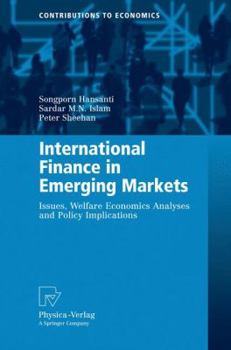International Finance in Emerging Markets: Issues, Welfare Economics Analyses and Policy Implications
Select Format
Select Condition 
Book Overview
This book reviews the contemporary issues in international monetary and financial economics (such as financial liberalisation, crisis, exchange rate determination, capital control, domestic capital market reform, etc.) in an emerging financial market such as Thailand from a welfare economic p- spective, highlighting the social welfare implications of these issues. This 3 book also suggests a normative social approach (as formalised in the new welfare economics paradigm) (see Islam 2001a, b for a discussion of this; concept) for analysing and addressing these issues and formulating appr- riate policies. Undertaking the above tasks, the asymmetric information paradigm 3 and other elements of the new welfare economics paradigm are adapted in analysing the international financial issues of Thailand, their causes and economic and social welfare consequences. The last two decades have been a critical period for Thailand's dev- opment. From the mid-1980s to the beginning of the 1990s, the Thai economy performed remarkably well and was a showcase for the world economy. Having achieved a double-digit growth rate for a brief period, Thailand in the late 1980s was regarded as the fastest growing economy in the world by the World Bank and the IMF. With prospects of further rapid economic growth, the Thai government accepted Article VIII of the IMF, which required Thailand to liberalise and deregulate its financial system.
Format:Paperback
Language:English
ISBN:3790825557
ISBN13:9783790825558
Release Date:October 2010
Publisher:Physica-Verlag
Length:226 Pages
Weight:0.75 lbs.
Dimensions:0.5" x 6.1" x 9.2"
Customer Reviews
0 rating





